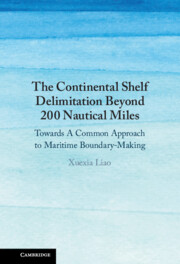 The Continental Shelf Delimitation Beyond 200 Nautical Miles
The Continental Shelf Delimitation Beyond 200 Nautical Miles from Part II - Delimitation Methodology for the Continental Shelf beyond 200 Nautical Miles
Published online by Cambridge University Press: 08 October 2021
This chapter explores a broader question with respect to the delimitation methodology for the continental shelf beyond 200 nautical miles, namely, whether an equitable solution for the continental shelf differs from that for an exclusive economic zone. Examining resources-related circumstances, conduct of the parties, and special characteristics of the maritime zones, this chapter argues that a court or tribunal hardly resorts to regime-specific circumstances in maritime delimitation, because maritime delimitation is a spatial exercise that spells out the relationship between the relevant coasts and the maritime areas. It thus concludes, on the basis of the State practice and the jurisprudence that witnesses a trend towards a single exercise of maritime delimitation, the law of maritime delimitation will develop to embrace a common approach to maritime delimitation within and beyond 200 nm.
To save this book to your Kindle, first ensure no-reply@cambridge.org is added to your Approved Personal Document E-mail List under your Personal Document Settings on the Manage Your Content and Devices page of your Amazon account. Then enter the ‘name’ part of your Kindle email address below. Find out more about saving to your Kindle.
Note you can select to save to either the @free.kindle.com or @kindle.com variations. ‘@free.kindle.com’ emails are free but can only be saved to your device when it is connected to wi-fi. ‘@kindle.com’ emails can be delivered even when you are not connected to wi-fi, but note that service fees apply.
Find out more about the Kindle Personal Document Service.
To save content items to your account, please confirm that you agree to abide by our usage policies. If this is the first time you use this feature, you will be asked to authorise Cambridge Core to connect with your account. Find out more about saving content to Dropbox.
To save content items to your account, please confirm that you agree to abide by our usage policies. If this is the first time you use this feature, you will be asked to authorise Cambridge Core to connect with your account. Find out more about saving content to Google Drive.